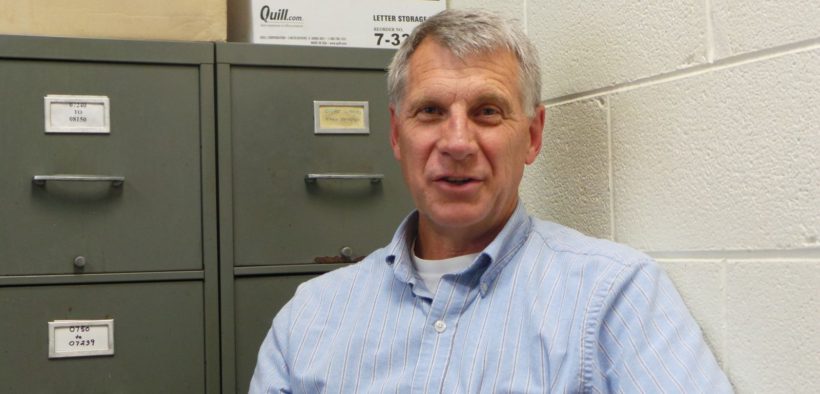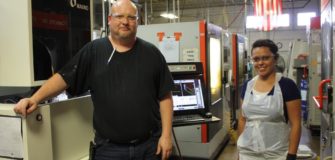TMA Profile: Doin’ Right Over 40 Years, Do-Rite’s Alan Szymanski
Share

SOUTH CHICAGO HEIGHTS – Alan Szymanski was in diapers when his dad and a partner started Do-Rite Die & Engineering in south Cook County, Illinois. While growing up, Alan spent a lot of time working with his dad at the shop, learning a good work ethic and asking lots of questions.
When the time came for college, Alan obtained an engineering degree and went to work at a nuclear plant. It wasn’t long though, before Alan told his dad he wanted to come back to South Chicago Heights and work in the family business with his brother.
Now at age 62, Alan’s been at Do-Rite for over forty years, and he’s very pleased his son Paul is learning the die making business just like he did.

Over those years Do-Rite’s been in business, the tool industry has changed in many ways.
One change is that toolmakers don’t seem to encourage their children to enter the field.
“I find that sad,” he said in a recent interview with TMA. “Our son is learning the business and we have hope that our grandkids will be interested in the years ahead.”
It’s important to be exposed to die making over years because it is a skill that can’t be learned overnight.
“We need toolmakers that can design and run the machines at the same time,” he said. “It takes four to five years of putting those skills together to become a good toolmaker. While it’s great to use new machinery and computer programming with the latest technology, you just can’t learn tool making in a crash course.”
So many in the industry encourage their kids to become doctors and lawyers, but that may be changing, Szymanski said.
Local high schools and junior colleges guidance counselors are searching for careers for their students that are practical and open, and in many cases, those schools are seeking advice from tool making industry leaders. Volunteering to serve on advisory committees is an excellent way to get involved in the community and to stir interest in tool making as a career alternative.
“It’s a great way to guide young people into jobs that will produce a respectable income and encourage creativity and ingenuity,” Szymanski said.
While design technology advances allow Do-Rite to create dies and castings quicker and more efficiently, competition with foreign manufacturers and government regulations is making it tougher to keep business moving forward.
“We are now getting requests to fix dies that were manufactured across the ocean, and sometimes those parts may not do the job they were ordered to do,” Szymanski said.
“We’ll get a call to fix something made in China, and in most cases, the job requires us to start all over to meet the customer’s demands. We can’t just fix what someone else makes when we don’t know how the steel was tempered or the carbonite was worked. Many of our customers are finding they don’t save as much as they thought they would by sending their work overseas. It some cases, their choices actually cost them more.”
Still, Do-Rite lost a major contract with Skil Power Tools after 40 years when the operation moved to China. That loss was a major blow to Do-Rite’s financial position, and while they were one of the 64 percent tool companies that survived 12 tough manufacturing years, they’ve struggled since 2010 to return to profitability and to begin considering expansion.
“We’ve kept lots of families with incomes over the years, but we’ve never sought to be rich, nor have we become rich,” Szymanski said.
“Do-Rite’s reputation for doing good work and keeping our customers happy has kept us going, and we hope will help with the next generation that runs this business,” he said.
In 1969, Alan’s father built the building where Do-Rite is now located, and Alan says if the company expands to the empty lot next door, it will likely wait for sometime in the future when his son is in charge.
“We’ve talked about moving out of Cook County and Illinois,” Alan said. “Will County is four blocks south of us, and the Indiana border is a mile or two east. It’s tempting to re-locate, that’s for sure.”
Illinois’ taxes, fees and worker compensation costs are squeezing businesses out of the state, while foreign tool-making companies are setting up shop in the southern states.
“But we need industry partners nearby that we can work with and know what they’re doing,” he said. “Our property taxes are high in Cook County, but moving would cost us even more. This is probably where we’ll stay. It’s just not going to be profitable for us to make a major move in the foreseeable future.”
Networking and gathering helpful information through TMA has been very helpful, Szymanski said. The company often sends its newest hires to TMA training schools at the Park Ridge facility.
“It’s important to keep in touch with others in the business, learn about the newest technology and share ideas,” he said. “Those are key reasons why we’ve stayed involved in TMA over the years.”
For Alan, the focus is now on the Do-Rite’s future.
“We’ve worked hard to keep customers and get new ones with referrals,” he said. “There will always be a need for tools and dies, and there will always be a need for those that make them. Our challenge will be to find the right people with the right skills to fill those positions.”
Do-Rite Die & Engineering Company was established in 1953 and has been located at 3344 Butler Street in South Chicago Heights since 1969.
First published in Technology & Manufacturing Association’s September 2014 News Bulletin. By Fran Eaton.


